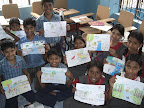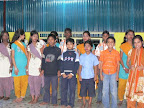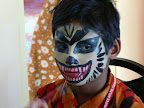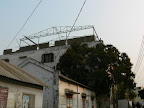 The Hand washing Health awareness programme is continuing with a variation on the original plan. The Health Care Centre team decided to consolidate the message of how important correct hand washing with soap and water or correct and washing with ash and water is as a means of preventing diarrhoea, acute respiratory infection, conjunctivitis and skin problems.
The Hand washing Health awareness programme is continuing with a variation on the original plan. The Health Care Centre team decided to consolidate the message of how important correct hand washing with soap and water or correct and washing with ash and water is as a means of preventing diarrhoea, acute respiratory infection, conjunctivitis and skin problems.Instead of delivering one Hand Washing awareness training session to all students in the school and their families, the health care centre team will focus on raising awareness and educating thirty students and two of their family members each. This will consolidate the message with a smaller group who can then become change agents for the school and their community. All four sessions focus on hand washing and hygiene but use different approaches to deliver the message. Prior to the first workshop family visits take place with the students selected to take part in the hand washing awareness program. The purpose of these visits is to collect baseline information and to personally invite family members to attend the workshop.
The first session provides an overview of:- when hand washing is important; the type of illnesses correct hand washing can prevent; a demonstration and hand washing practice for everyone present using the technique recommended by the World Health Organisation; viewing of an episode focussing on hand washing and hygiene from the Mina DVD . During the workshop students and family members are invited forward to help describe posters depicting transmission of illness and prevention of illness. At the end all families are given a gift of soap and a chart describing hand washing technique in Bangla and diagrams.
 The second session is a poster drawing competition. The theme of the posters is improving health and hand washing awareness. Three students will be given prizes. Those who draw posters which are best able to send hand washing health awareness messages will be given judged first second and third.
The second session is a poster drawing competition. The theme of the posters is improving health and hand washing awareness. Three students will be given prizes. Those who draw posters which are best able to send hand washing health awareness messages will be given judged first second and third.The third session is for students and their families and focuses on the importance of maintaining health and hygiene in other ways such as not eating open food (food that is not covered or prepared in a hygienic way), washing thoroughly and cooking safely. A demonstration of hand washing with ash and water as well as practice will also take place. At this session all families will be given a new towel for drying after hand washing as well as a Certificate of Attendance.
The fourth and final session will involve the thirty students coming together to practice a hand washing drama and then perform that drama in front of their families. They will by now have a very thorough understanding of why hand washing and hygiene is important and how this can be of benefit to their families and the community. The prize winners of the poster drawing competition will be announced at this time and prizes presented.
The Health Care Centre team hope that the students who participate in this program will be able to educate their classmates in an informal way. And also, those family members will talk to neigbours about what they have learnt. Additionally it is anticipated that students who have participated will have less presentations at the medical centre for illness related to poor and washing and hygiene practices.






No comments:
Post a Comment